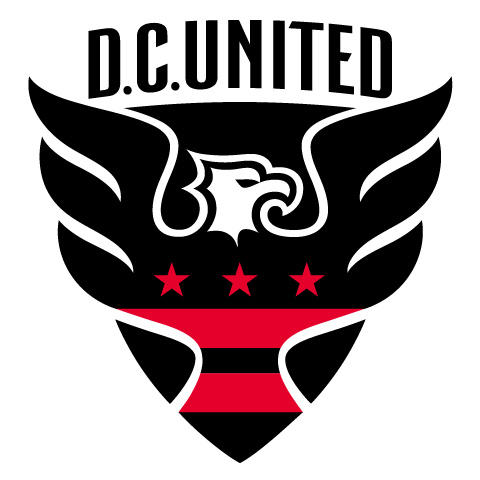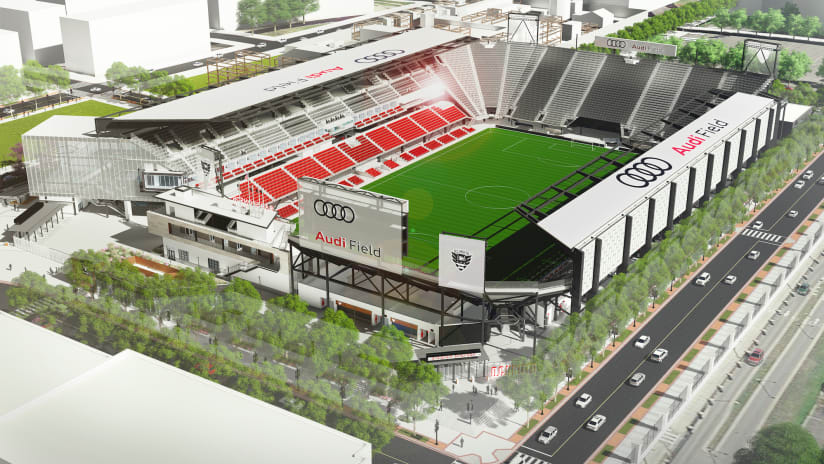Today, D.C. United, Mayor Muriel Bowser and the Department of Energy and Environment (DOEE) announced the closing of a $25 million private clean energy funding package for installation of state-of-the-art energy and water efficiency measures, an 884 KW solar array, and stormwater retention systems on Audi Field, United’s new soccer-specific stadium with capacity for 20,000 people opening next year. These measures are funded through DOEE’s Property Assessed Clean Energy (DC PACE) program, D.C.’s innovative green funding solution which operates through a public-private-partnership, allowing local lenders to fund environmentally beneficial projects at no cost to taxpayers. This innovative tool helps spur economic development while providing substantial environmental benefits that benefit the entire city. This deal, done through a partnership with locally-based EagleBank, marks the nation’s largest single PACE note issued to-date, and the first issued for a stadium project.
“D.C. United are committed to building an environmentally responsible stadium, in addition to providing a world class soccer venue,” Jason Levien, United managing general partner, said. “DC PACE funding is allowing this project to achieve LEED Gold certification from the United States Green Building Council (USGBC) and to save about $125,000 annually on utility bills through LED lighting on the field and a host of other green measures throughout the site. As the first stadium to use PACE financing, we are excited to make Audi Field a national leader in environmental performance and green community benefits.”
The hallmark of the deal is the planned installation of 884KW of building-integrated solar panels installed on the stadium’s canopy and throughout the site. This system, to be developed by D.C.-based New Columbia Solar, will provide roughly one million kilowatt hours of solar power annually, enough to offset almost a third of the stadium’s projected electricity usage. PACE will also fund high-efficiency heating and cooling systems, LED field lighting, additional building insulation, low-flow water fixtures, a green roof, and stormwater management measures that meet the District’s highest standards for protecting the Anacostia River.
“We know that cities throughout the U.S. will be leading the fight against climate change, and this deal is an example of how Washington, D.C. can think globally while acting locally,” Mayor Bowser said. “This deal will not only allow us to green Audi Field, it will also create new opportunities for local businesses and high-quality green jobs for D.C. residents.”
In total, the stadium’s PACE-funded measures will result in a 25 percent reduction in energy use and will reduce emissions by 820 metric tons of CO2 annually – roughly equivalent to taking 173 cars off the road. These reductions are critical components of Washington, DC’s ongoing efforts to achieve the Sustainable DC and Clean Energy DC goals, which call for reducing greenhouse gas emissions by 50 percent, increasing the use of renewable energy to 50 percent of the District’s energy supply, and reducing energy use by 50 percent by 2032. In addition, through green roofs, bioretention areas, and infiltration basins, the site will provide storage for more than 55,000 cubic feet of stormwater onsite.
“The solar energy and green features of Audi Field prove what’s smart for the environment can be good for local business, too,” said Bracken Hendricks, CEO of Urban Ingenuity, Program Administrator for DC PACE. “With this project, D.C. United, EagleBank, DOEE, and New Columbia Solar demonstrate how green measures save money, boost local economic development, and create good green jobs for District workers, all without costing D.C. government a cent. These voluntary measures create community benefits on day one, and are repaid through savings over time. This project is good government and good for the planet, pure and simple.”




